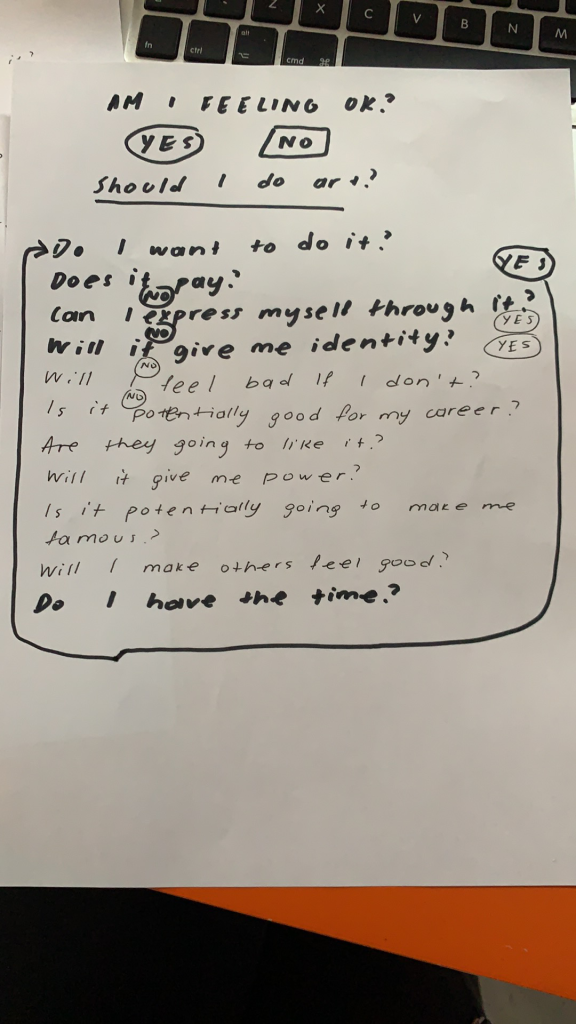Art is one of those dense words; it’s small yet it carries thick information. By definition, art is a way of communicating a message through different mediums (e.g., paintings, music, sculptures, etc). An exercise to understand your emotions is to think of the emotion and then draw whatever comes to your mind with whatever colors. Sometimes, you need to trigger other parts of your brain to figure the answer.
Nonetheless, how has art influenced our behavioral patterns? Even though, Maslow’s hierarchy of needs is been criticized for its validity since it was mostly tested on white caucasian middle-class men; hence it’s not applicable for everyone, everyone’s motivated to reach his/her self-actualization. Maslow (1954) explained that someone is in a state of self-actualization when the individual is doing what he/she is fitted for. Art and creativity are included on this level since one can interpret the meaning of art and make art, by prioritizing other needs in his/her life. This sparked my curiosity to ask some dear friends, who are visual artists, “How does art impact our psychological state, and how does psychology affect art?” Personally, I was intrigued by their answers.
Art in all its possible forms is a way to express one’s perspective in the world. An artist’s psychological state often reflects directly onto the pieces they are making, be it painting, sculpture, music, poetry; and so, such reflection is being further passed onto the viewer. However, this often changes and adapts in the way the world itself shifts within different realms of contemporaneity.
As an artist, there are always two ways to look at how one may perceive and be affected by such changes. Firstly, there is a more holistic approach, which consists of things that affect the whole of humanity, and secondly, there is the personal domain, which consists of things that have to do with one’s self and inner cosmos.
Personally, in expressing myself through artistic means has helped me overcome many psychological struggles of my own during different periods in my life. My work derives from reality, and it aims to explore alternative ways of seeing the present by fictionalizing it. So, being able to have this creative output in times like these, i.e. in the recent post-Trump and, what hopefully is soon to be, post-covid era, I try to look past the state of a rather miserable present, and aim to imagine several possible futures.
M.M
There is so much connection between psychology and art. How we feel and how our mind functions is intrinsically linked to how we view the world and how we function in relation to others around us. The most iconic example in the history of art is Van Gogh, who was a deeply troubled soul, but created the masterpieces that we all know of. Van Gogh suffered from psychotic episodes, delusions and depression. Knowing that about him, does it change the way we view his art? I believe it offers an extra layer of interpretation in his work, but one can still enjoy Van Gogh’s paintings without that information. Does the swirly sky in Starry Night depict Van Gogh’s perturbed soul?
I am a painter myself and the reason I turned to painting was that I felt different and I wanted to express myself in alternative ways. I felt that there were things I wanted to say that I couldn’t do with words and painting seemed to somehow liberate me. I could express myself with colours and shapes better than I could with words. I was always afraid of confrontations, expressing how I really feel but I can do that through my painting. I can express my emotions through my works: anger, happiness, anxiety and fear. Art has been an innate need for humans since prehistory as demonstrated by cave paintings. Don’t these works of art prove our need to express ourselves, show that we existed and that we felt? I personally, relate to those prehistoric people that left their marks in the walls of their cave. A way to connect with others around them, understand their past but also communicate with the future.
A.C

Εν ξέρω αν μπορώ να απαντήσω ακριβώς την ερώτηση επειδη εν είμαι σίγουρη τι ακριβώς εν η σχέση του. Εν πιστεύω πλέον ότι εν τζίνη η πιο ξεκάθαρη σχέση της ψυχολογίας τζαι της τέχνης όπως εφαίνετουν πιο παλιά στο “history of art” π.χ. Blue Period του Picasso, πολλά cliché παράδειγμα, απλά τζιαμέ υπήρχε άμεση σχέση με την κατάσταση που ήταν ο καλλιτέχνης τζίντο τζαιρό, το χρώμα τζαι το θέμα. Νομίζω πλέον εν λειτουργεί έτσι.
Ξεκάθαρα η τέχνη λειτουργεί όπως ούλλα τα πράματα, αν εν κάτι που σου κοινά το ενδιαφέρων, σίγουρα μπορεί να σε κάμει να νιώσεις καλά, π.χ. αν μου αρέσκει να θκιαβαζω λογοτεχνία τζια θκιαβάσω ένα ωραίο βιβλίο, εννοείτε ότι εν απόλαυση τζαι εν να επηρεάσει τη ψυχολογία μου, αν μου αρέσκει να παιζω μπάσκετ τζαι νικήσω ένα παιχνίδι εν κάτι παρόμοιο. Οπως τζαι νάσχιει, το να ξέρεισ για τέχνη τζαι να πιέννεισ σε μουσεία πλέον θεωρείται μια μορφή πνευματικής νοημοσίνης τζαι μπορει να σου δώσει status, άρα για το αν η τέχνη μπορεί να επηρεάσει τη ψυχολογία για κάποιον που εν νεν πραγματικά ενδιαφερόμενος, τζαι τζινη η ιδέα για μένα εν λίο διεστραμμένη.
Τωρά που την πλευρά του καλλιτέχνη, πιστευκω εν πάλε αρκετα μπερδεμένα τα πραματα σήμερα. Επειδή βασικά η τέχνη εν βιομηχανία τζαι εν πραγματική δουλεία αν θελεις να είσαι επιτυχημένος καλλιτέχνης. Η ψυχολογική κατάσταση ούλλον μας εν αρκετά ασταθής, εν θα νιώθεις πάντα καλά, εν θα νιώθεις παντα χάλια τζια νομίζω τούτο ισχιει για ένα περίπου για ούλλουσ. Αν θέλεις να είσαι καλλιτέχνης τζαι να δεσμευτείς με τούντο πράμα, πρέπει να είσαι σταθερός όπωσ ούλλες τες δουλειές. Σίγουρα για να είσαι επιτυχημένος πρέπει η δουλειά ναν προσωπική, γιατί τζίνον εννάν το μόνο που εν να σε κάμνει διαφορετικό που ούλλους τουσ άλλους, που τη στιγμή που ούλλοι έχουμε διαφορετικά βιώματα, άρα τζίνο εν το κλειδί. Για να εν προσωπικό τούτο σημαίνει ότι φυσικά η δουλειά σου επηρεάζετε που ούλλα όσα νιώθεις άρα νομίζω τούτο έρκετε αυτόματα, όπως ούλλα τα πραματα που κάμνουμε προβάλλουν τζίνα που νιώθουμε. Αλλά το point μου εν ότι εννεν μόνον τζίνο, υπάρχουν τζαι πολλές άλλες πιο ρεαλιστικές σκέψεις αν θέλεις να κάμνεις τέχνη.
D.P.

